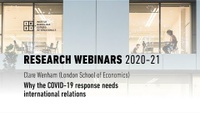Research Webinar: Why the COVID-19 response needs international relations
Clare Wenham (London School of Economics)
Chair and discussant: Andrea C. Bianculli (IBEI)
Research webinar available in video:
The COVID-19 pandemic affects all countries, but how governments respond is dictated by politics. Amid this, the World Health Organization (WHO) has tried to coordinate advice to states and offer ongoing management of the outbreak. Given the political drivers of COVID-19, Sara E. Davies and Clare Wenham argue this is an important moment to advance International Relations knowledge as a necessary and distinctive method for inclusion in the WHO repertoire of knowledge inputs for epidemic control. Historical efforts to assert technical expertise over politics is redundant and outdated: the WHO has always been politicized by member states. The authors suggest WHO needs to embrace the politics and engage foreign policy and diplomatic expertise. They suggest practical examples of the entry points where International Relations methods can inform public health decision-making and technical policy coordination. We write this as a primer for those working in response to COVID-19 in WHO, multilateral organizations, donor financing departments, governments and international non-governmental organizations, to embrace political analysis rather than shy away from it. Coordinated political cooperation is vital to overcome COVID-19.
Dr Clare Wenham is Assistant Professor of Global Health Policy. She is the Director of the MSc in Global Health Policy and sits on the steering committee of the LSE Global Health Initiative. She previously worked at the Department of Infectious Disease Epidemiology at the London School of Hygiene and Tropical Medicine, delivering a series of projects relating to surveillance and transmission of infectious disease. She has a PhD in International Relations at and has advised and/or consulted for UN Women, European Parliament, UNFPA, Asian Development Bank, and UK Parliamentary Office for Science and Technology.

